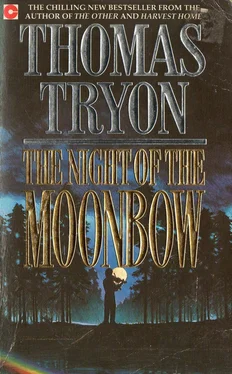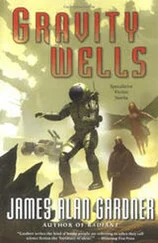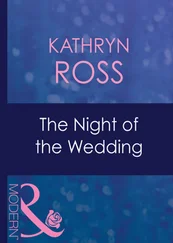Thomas Tryon - The Night of the Moonbow
Здесь есть возможность читать онлайн «Thomas Tryon - The Night of the Moonbow» весь текст электронной книги совершенно бесплатно (целиком полную версию без сокращений). В некоторых случаях можно слушать аудио, скачать через торрент в формате fb2 и присутствует краткое содержание. Жанр: Триллер, на английском языке. Описание произведения, (предисловие) а так же отзывы посетителей доступны на портале библиотеки ЛибКат.
- Название:The Night of the Moonbow
- Автор:
- Жанр:
- Год:неизвестен
- ISBN:нет данных
- Рейтинг книги:3 / 5. Голосов: 1
-
Избранное:Добавить в избранное
- Отзывы:
-
Ваша оценка:
- 60
- 1
- 2
- 3
- 4
- 5
The Night of the Moonbow: краткое содержание, описание и аннотация
Предлагаем к чтению аннотацию, описание, краткое содержание или предисловие (зависит от того, что написал сам автор книги «The Night of the Moonbow»). Если вы не нашли необходимую информацию о книге — напишите в комментариях, мы постараемся отыскать её.
The Night of the Moonbow — читать онлайн бесплатно полную книгу (весь текст) целиком
Ниже представлен текст книги, разбитый по страницам. Система сохранения места последней прочитанной страницы, позволяет с удобством читать онлайн бесплатно книгу «The Night of the Moonbow», без необходимости каждый раз заново искать на чём Вы остановились. Поставьте закладку, и сможете в любой момент перейти на страницу, на которой закончили чтение.
Интервал:
Закладка:
Tiger nodded; he had read Beau Geste. A Viking always took his farewell of life with a dog at his feet.
“And your mother? How’d she die?”
“She-she-” Leo gulped, and his jaws worked as he tried to articulate the words, but no sound materialized. His face flushed.
“That’s okay,” Tiger said, “let’s skip it.” Raising his wrist, he checked his Ingersoll. “Jeez, I better be getting to the store so I’m back in time for Swim.” He reflected for a moment, then framed a tactful question: “Aren’t you scheduled for ball practice with Coach this morning?” “Mmmm…” Leo nodded, closed his eyes, and lay back. The last thing he wanted to do right now was practice baseball, especially with Hap Holliday. Among the montage of images jumping about under his eyelids was a picture of the coach – “the all-American jockstrap,” as Leo had dubbed him in his journal – glove in hand, waiting for Wacko Wackeem to field a few flies. But Wacko was not Coach’s “kind of guy.” Nor, for that matter, was Coach Leo’s. That red, jolly face seemed to corrugate with consternation and dismay the moment Leo came upon the scene, and what point was there in trying to “measure up” when, where Hap was concerned, the percentages were so low?
All in all, Leo decided, he preferred staying where and as he was. Presently, he heard Tiger steal off, and through slitted lids watched him and Harpo cross the meadow and head for the Old Lake Road, a hundred or so yards away. Leo closed his eyes again, basking in the warm sun. How glorious to lie in a sweet-smelling meadow with nothing to do but make notes on a spider replenishing its pantry. He told himself he should collect the specimen and get back to camp (he was due at baseball practice before Morning Swim), but it was hard giving up such a spot as this; it was so quiet here; that’s what he noticed more than anything. At Pitt the stone hallways forever echoed with the frantic clamor of discontent, dissatisfaction, and despair, 150 boys in their leather-soles clattering up and down, the incessant racket of scores of voices, admonishing, correcting, quarreling, wheedling, whining, complaining, crying, cursing. Seventy-five double-decker wire-spring cots, each with a boy top and bottom, lined up in a brick-walled dormitory with barred windows and a coal stove at the far end, a long low-ceilinged room once used for the drying of hops for beer, a place where the nights resounded with coughing and moans, with whispers and mutterings and outcries, and dreams that flew about on dark wings, like bats.
This was a sweet corner of the world all right, the valley that cradled Moonbow Lake, with its red-siloed barns tucked like so many play-farms amid the softly rolling countryside that unfolded among the Jurassic outcroppings of schist and shale, and its thickly shaded forest glades, the tall, dark fir trees whose tips pointed like village church steeples toward the heavens. Until now, for Leo “the country” had meant only the hot, insect-teeming tobacco fields of upper Connecticut, arid, dusty acreage enclosed by endless miles of suffocating mosquito netting that was worse than a winding sheet for those unlucky fellows destined to spend their years sweating breathlessly beneath it, while so-called fresh air was the stuff you got in the cement-floored, rusty-fenced playground at the Institute, with its jail-like steel-pipe jungle gym and oil barrels to play on.
But this – this was Longfellow land, the forest primeval and its murmuring pines and the hemlocks, and the sweet green meadow where Leo lay was as close to utopia as he was likely to get – his own private domain, as he’d begun to think of it. It was almost as if he had been drawn to it, he decided, because getting here wasn’t easy. This is how you did it: You left Jeremiah and walked up the line-path to the cow-crossing, where the sagging rack of mailboxes defied the force of gravity, then turned left down the Old Lake Road, passing along the northern flank of Indian Woods, laced with a confusing network of paths, a maze that – if you knew its secrets – eventually brought you out at the Wolf’s Cave, where the Senecas held their sacred campfires (and where the uninitiated didn’t dare venture). But if instead of entering the woods you walked on a little farther up the road, past Pissing Rock, you came upon a pair of decrepit posts and, bisecting them, the beginnings of an old trace, a grassy track that ran between two rows of tall pines to form a wide, shaded lane covered with fallen needles, a soft, luxurious carpet under your feet. At the other end of the lane lay the meadow, contained on one side by the pond, and on the others by a palisade of dark fir trees, their apexes piercing the bright-blue sky, seeming now to impale the fleecy clouds, shepherded east to west by a light breeze. The blue-green grass, dotted with buttercups and daisies, grew tall, so that, on his first foray to the meadow, he had almost missed the pond altogether – a body of water no more than five hundred feet in length, half that across, still as glass at the near end, at the far stirring itself and falling into rapid motion where its outlet crossed a weir to fret its way in a noisy babble some fifty yards to the ruins of Kelsoe’s icehouse and the small cove called the China Garden, filled with lotus-like water lilies.
There was another feature of this place that made it special, however, that in an odd way made it seem to belong to him, to be his personal property. Off to his right, on the far side of the meadow, partly hidden by the stand of sentinel pines, he could make out the bay window in the “tower” of the old Steelyard place, the Haunted House. The house had struck a profound chord in him that first evening when Hank Ives had driven him past it in the jitney. And afterward – there had been something to do with the house in his dream, something connected with Pa Starbuck’s story of the Moonbow Princess, only Leo hadn’t been able to figure out what it was.
What he did know was that there had been just such a turret window in the house over Rudy Matuchek’s butcher shop on Gallop Street. Leo had hated that house – his house – but the window was different. The window had belonged to her, to Emily, his mother – and as he looked over to the Steelyard property now, it was almost as if he' expected to see her sitting up there, just as she used to when he was a child, waiting for him to come home from school, with Butch beside her, waiting too.
Now Butch was buried under a tree behind the garage, and Emily, she was buried – well, Leo didn’t know where, because he’d never seen her grave, or Rudy’s, for that matter; though he knew they were buried somewhere together, somewhere at Saggetts Notch – Mrs Kranze had told him so – hadn’t she? Funny about Mrs Kranze, whose face he’d known so well, but could no longer remember -along with all the other things he had trouble recalling.
He turned from the house and his eye fell on his violin case. The sight of it prodded him: he had promised Miss Meekum that he would practice every day. Carefully he opened the case and lifted out the violin; then, seated there beside the pond, he began to play, softly, for no other ears, his bow moving and angling as it coaxed sweet notes from the hollow heart of the instrument.
He had played for half an hour or so when, suddenly, he stopped, his concentration broken by the rapturous trilling of a bird somewhere above his head. Was it a mockingbird? Certainly it possessed an extraordinary repertoire. Leo craned to find it: yes, there it was, feathered gray and white, perched above him, its throat throbbing with song. How was it that such a plain, un-likely-looking creature could produce such a glorious melody?
“No rhapsodies in this house!”
He heard the detestable voice saying the hated words.
Читать дальшеИнтервал:
Закладка:
Похожие книги на «The Night of the Moonbow»
Представляем Вашему вниманию похожие книги на «The Night of the Moonbow» списком для выбора. Мы отобрали схожую по названию и смыслу литературу в надежде предоставить читателям больше вариантов отыскать новые, интересные, ещё непрочитанные произведения.
Обсуждение, отзывы о книге «The Night of the Moonbow» и просто собственные мнения читателей. Оставьте ваши комментарии, напишите, что Вы думаете о произведении, его смысле или главных героях. Укажите что конкретно понравилось, а что нет, и почему Вы так считаете.












